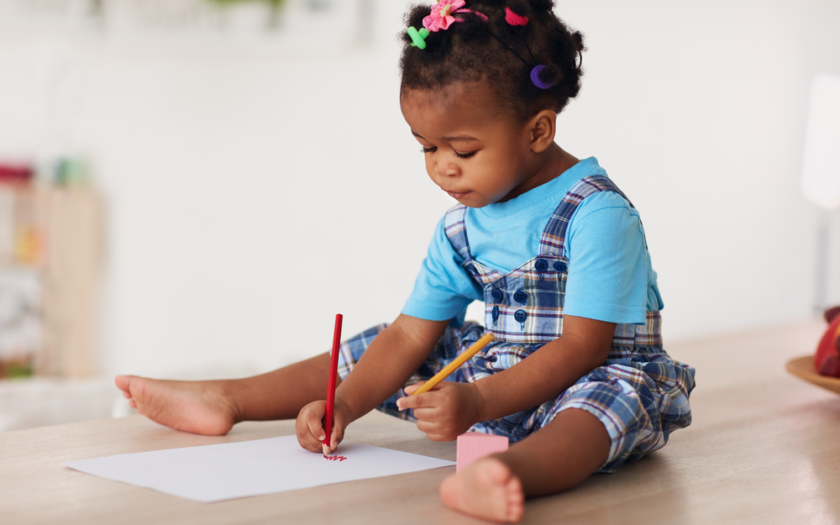At eight months, your baby is making significant strides in their physical, cognitive, and emotional development. This stage is marked by increased mobility, improved communication, and a deeper understanding of their surroundings. Recognizing and supporting these key milestones can help you nurture their growth and celebrate their progress.
Milestones and More: What Your 8-Month-Old Can Do
At eight months, your baby is likely exploring their environment with increased mobility, which means you’ll need to stay vigilant to keep them safe. Watching their curiosity and fascination as they discover the world around them is truly rewarding.
By this age, your baby is probably eating solid foods in addition to breastmilk or formula. Many eight-month-olds enjoy finger foods such as small pieces of soft raw fruit (like banana or avocado), boiled or steamed vegetables (such as soft beans or pumpkin), and toast or rusks. While breastmilk or formula remains their primary source of nutrition, their milk intake might decrease as they consume more solids. Ensure that milk and solid foods are well-spaced to maximize their milk intake. Regular cow’s milk or other non-infant milks are not recommended as the primary milk source during the first year.
Your baby will need around 14 hours of sleep in a 24-hour period, including one or two daytime naps. Sleep patterns can vary, with some babies taking shorter naps or waking frequently at night.
As your baby becomes more active and requires more stimulation, you might find yourself busier. This stage can demand a lot of patience and energy, so it’s important to remember to take care of yourself and seek breaks if you feel overwhelmed.
You might also notice your baby’s first tooth bud appearing, usually in the middle of their lower jaw. If teething hasn’t started yet, don’t worry; it’s normal for the first tooth to appear as late as 12 months. When teething begins, increased drooling is common, and a teething ring can help alleviate discomfort.
Exploring Abilities: What Your 8-Month-Old Can Do
At eight months, your baby is rapidly developing new skills and capabilities, offering a glimpse into their growing independence and curiosity. This stage is characterized by increased mobility, refined motor skills, and enhanced communication. Understanding what your baby can do at this age helps you support their development and celebrate their achievements.
- physical Development. By eight months, your baby is likely sitting confidently without support and may be crawling or shuffling on their bottom. It’s perfectly normal if your baby skips crawling and goes straight to walking. At this stage, babies are becoming stronger and more mobile; they might be able to pull themselves up to a standing position using furniture. To ensure their safety, keep dangerous items like electrical cords, unstable furniture, and hot drinks out of reach.With increased mobility comes a higher risk of bumps and knocks, which are a natural part of childhood exploration. While it’s important to baby-proof your home, try to balance safety with allowing your baby the freedom to explore and test their limits. This exploration is crucial for their development;
- cognitive Development. At this age, your baby will actively search for dropped or hidden objects and may use their index finger to point at things. They are refining their grasp, learning to pick up small items using their thumb and first or second fingers, and can scoop up food to hold in their fist. Banging objects together, dropping and throwing things, and putting objects in their mouth are common behaviors. Your baby will also start to understand the function of objects and enjoy interactive toys, such as activity centers that make noise when twisted, poked, or pressed.Their vision will have improved significantly, with depth perception almost comparable to an adult’s. They will recognize you from across the room and search for people when their names are called. They may also be able to point to objects in a book when you name them;
- social Development. As your baby grows, they may exhibit signs of separation anxiety, such as crying or clinging when you leave. This anxiety can also make sleep more challenging. Over time, your baby will learn that you always return and will gradually build trust with other people in their life;
- emotional Development. Your baby will feel most secure when you are around and may become anxious or stressed if you are not present. They will actively explore and play while you are nearby and will frequently return to you for reassurance. This behavior helps them feel secure and supported as they navigate their environment;
- language Development. Your baby may begin to respond to their name and recognize the names of familiar people in your household. They will continue to babble in a tuneful manner and enjoy engaging in “conversations” with you, using their growing language skills to interact and communicate.
At eight months, your baby is making remarkable strides in physical mobility, cognitive understanding, and emotional development. Supporting their exploration and interaction with the world around them is crucial for their growth. Embrace these milestones as exciting opportunities to nurture their abilities and strengthen your bond.
Fostering Growth: How to Support Your Baby’s Development
Engage with your baby regularly to nurture their language skills and comprehension. The more you talk to them, the better they will understand word meanings and conversational cues. Use varied vocal tones, respond to their sounds, and incorporate expressive facial gestures to enhance their understanding of communication.
Playing with your baby at this stage can be both fun and educational. They enjoy toys that make sounds, like bells, and will delight in interactive games. Get on their level and engage in activities like crawling around together, making funny noises, or pretending to be different animals. Physical play is essential for building muscle strength and coordination, while interactive games foster a sense of security and affection.
Development Problem Signs
Babies develop at their own pace, but if you notice the following concerns at eight months, consult your doctor or maternal child health nurse:
- your baby hasn’t started to move or holds their body stiffly rather than sitting;
- they show no interest in or aren’t reaching for objects;
- they don’t recognize you or a primary caregiver, or lack eye contact;
- they aren’t turning towards voices, sounds, or their own name;
- they aren’t babbling or repeating sounds.
Supporting your baby’s development involves consistent interaction, engaging play, and encouragement of physical and cognitive skills. By actively participating in their learning and growth, you help build a strong foundation for their future. Embrace this dynamic stage with patience and enthusiasm, celebrating each milestone as your baby flourishes.



